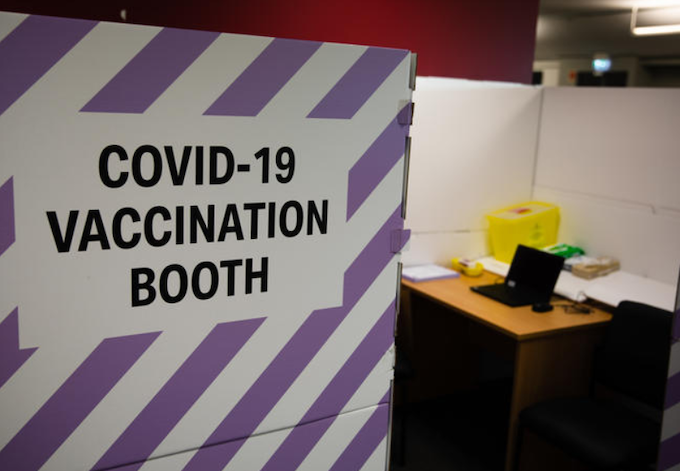
By Katie Doyle of RNZ News
A new anti-vaccine publication with links to the Advance New Zealand fringe political party should be ripped up and thrown in the bin, a health expert says.
From Te Puke, Dr Christine Williams discovered the magazine in her work staff room.
It had been brought in by a concerned receptionist, who found it in their letterbox at home and wanted to show their colleagues what was being circulated.
- LISTEN TO RNZ MORNING REPORT: ‘A recitation of a range of conspiracy theories’ – Professor Gorman (duration 5:08
- The fight against vaccine disinformation – New Yorker
- What makes people believe in conspiracy theories?
- Auckland moves to alert level 1 at noon today
The first and special edition of a magazine claimed to tell the real story about covid-19 and vaccines.
“The danger of it to me is that it’s sitting around. Like you can find something on a Facebook site or something and you see it and it’s gone.
“Whereas this is sitting around. Lots of people can come and read it and it’s not truthful,” Dr Williams said.
The more than 40-page magazine contains conspiracy theories about vaccines, billionaire Bill Gates, herbal cures and lockdown.
Hold editors to account
Dr Williams wanted the editors held to account.
“I think it’s dangerous. [They should be] held to account I think … made to defend their views based on science, which they wouldn’t be able to do,” Dr Williams said.
Near the end is a half-page advertisement for the Advance New Zealand Party, formed in 2020 by former National MP Jami-Lee Ross.
The magazine’s website credits Advance NZ for fundraising to print the magazine and inviting members and supporters to get in touch if they want to help with mailbox drops in their area.
It says the party invited members and supporters to touch base if they wanted to help with mailbox drops in their area.
However, the website also states its editors are not members of Advance NZ or any other political party.
Advance NZ has also been promoting the magazine on its website and fundraising to print, post, and package 100,000 copies.
Contact attempts unsuccessful
Attempts by RNZ to contact Ross and Advance NZ have been unsuccessful.
The magazine has been cropping up throughout the country, including Wairarapa and Northland.
A Facebook post from Advance NZ in February states some 300 volunteers had received 60,000 copies for distribution.
Masterton resident Katy McClean discovered one in her letterbox last week.
“To me, it’s kind of scaremongering, there’s a lot of stuff in there that doesn’t seem to be very factual,” she said.
Her husband Aiden was equally unimpressed.
“If people don’t have an understanding of how to critically look at publications, they may take this information on face value,” he said.
Undermining covid efforts
“And that can really undermine the effort of everybody in order to keep covid suppressed in this country.”
In Kerikeri, Sylvie Dickson found two copies at her local takeaway.
“I didn’t know if they’d left it there for customers or if somebody had just left it there, but I saw the rubbish bin there and I thought I’ll do everyone a favour and put it in there.”
University of Auckland professor of medicine Des Gorman said anyone who received the magazine should “rip it up and throw it away”.
“In the context of encouraging free and open speech, there is a fine line, and this publication crosses that line,” he said.
“There is no merit in this publication, so my advice to people would be not to read it, and to rely upon the advice they get from their family doctor.”
Professor Gorman said if people were genuinely worried about health issues and vaccines they needed to speak with a trusted health professional.
‘Dangerous’ publications
He said publications that discouraged masks, basic public health measures and vaccinations were dangerous and should be discouraged.
“I’m not sure, if I read this 20 times, I could find any merit in this,” he said.
“I’m the last person to discourage free speech and freedom of speech but there’s a helluva big difference between an honest opinion well-held and this sort of stuff.”
Professor Gorman told RNZ Morning Report the magazine “dangerously, looks quite professionally done”.
“It has an aura of credibility around it in terms of its construct and that’s one of the many things that worries me. For the people who are vulnerable to these sorts of arguments, and those who are already vaccine hesitant, this may look like a quasi-official or even perhaps a scientifically underpinned piece of writing, which of course it isn’t,” Professor Gorman said.
The magazine gave an impression of a solid body of work – but really, it was a “recitation of a range of conspiracy theories”.
He was concerned it was targeted to disadvantaged communities in terms of healthcare or access to healthcare professionals, or those who felt the health system had not met their needs.
“This magazine violates freedom of expression because it is a litany of lies.”
The editors of the publication said they would not speak with RNZ unless it was in a live broadcast.
This article is republished under a community partnership agreement with RNZ.












































